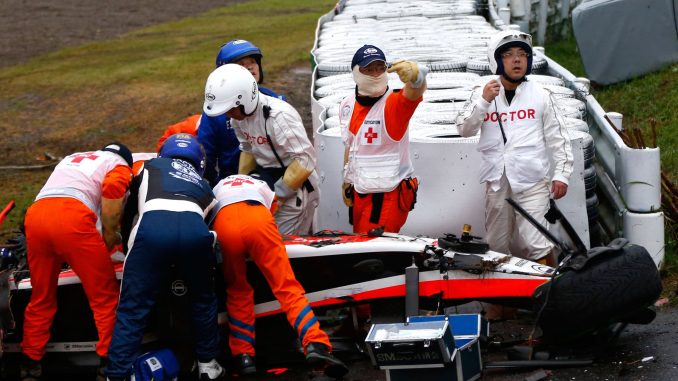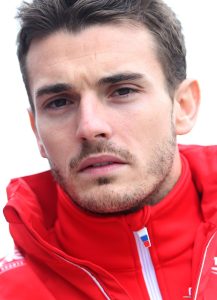
 Jules Bianchi, a 25-year-old Formula One driver, tragically passed away nine months after a severe accident during the 2014 Japanese Grand Prix. This was the first driver fatality in Formula One since Ayrton Senna’s death in 1994. Bianchi lost control of his car during a caution period and crashed into a crane that was removing another car from the track, resulting in catastrophic brain injuries. He never regained consciousness.
Jules Bianchi, a 25-year-old Formula One driver, tragically passed away nine months after a severe accident during the 2014 Japanese Grand Prix. This was the first driver fatality in Formula One since Ayrton Senna’s death in 1994. Bianchi lost control of his car during a caution period and crashed into a crane that was removing another car from the track, resulting in catastrophic brain injuries. He never regained consciousness.
After initially receiving treatment in Japan, Bianchi was transferred to a hospital in Nice, France, where he remained in a coma until his death. His passing shocked the motorsport community, which had been largely free of driver fatalities for over two decades due to improved safety measures following Senna’s accident. Bianchi’s death, however, reignited concerns about the risks drivers face on the track.
After Jules Bianchi’s tragic accident, the International Automobile Federation (FIA) launched an investigation to determine its cause and to recommend preventive measures. While Ayrton Senna’s fatal accident in 1994 led to extensive safety reforms in Formula One, the aftermath of Bianchi’s crash did not bring about sweeping changes. The panel’s findings, released two months after the incident, indicated that Formula One’s existing safety protocols were adequate and that Bianchi had not sufficiently reduced his speed under double caution flags.
Despite this, the accident did prompt the introduction of the **Virtual Safety Car (VSC)** system. This system was developed to ensure that drivers reduce speed more consistently and quickly in hazardous situations, improving safety during incidents on the track. The VSC automatically limits the pace of all cars when dangerous conditions arise, offering a more immediate response to avoid risks like the one that caused Bianchi’s accident.
The federation’s president, Jean Todt, ordered the report, which drew criticism from a large number of followers and journalists. Since 2006, Bianchi’s career has been managed by Nicolas, Todt’s son.
Following the death of Ayrton Senna, Formula One faced criticism for becoming “too safe,” with some feeling that it had lost its edge. However, Jules Bianchi’s fatal accident served as a sobering reminder of the inherent risks involved in racing. In response to the tragedy, the Grand Prix Drivers Association (GPDA) issued a statement acknowledging the ongoing dangers of the sport, emphasizing that despite the advances in safety, drivers must continue to push for improvements to honor Bianchi and others lost in racing.
Bianchi came from a family deeply familiar with the perils of motorsport. His grandfather, Mauro Bianchi, survived a serious accident at the 24 Hours of Le Mans in 1968, while his great-uncle Lucien Bianchi tragically lost his life in a crash at the same event the following year. Jules himself rose to prominence in the racing world, becoming the first driver since Alain Prost to win the French Formula Renault series in his debut year in 2007, showing early promise for a stellar career in Formula One.
Bianchi’s accident ultimately reignited the conversation about safety in motorsports, reinforcing the need for constant vigilance and innovation to protect drivers.
In 2009, Jules Bianchi captured the Formula 3 Euro Series title in his second season, marking him as a rising star in motorsport. His impressive performance led him to join Ferrari’s driver development program, and by 2011, he was serving as a test driver for Ferrari. At the time of his death, Bianchi remained contracted to Ferrari, with the possibility of securing a future driving position with the team.
In 2013, Bianchi began driving for the Manor Marussia team in Formula One, where he achieved a significant milestone for the team. He scored its only points since its debut in 2010 by finishing ninth at the Monaco Grand Prix in 2014. His remarkable performance underlined his potential as a future star in the sport.
After Bianchi’s passing, his family expressed deep gratitude to all who had supported them during the difficult months after his accident, acknowledging the strength they gained from the outpouring of love and support from his colleagues, fans, and friends.
Get more related contents on sportwords.co.ukhttp://sportwords.co.uk
Leave a Reply